Discover a range of self discovery activities tailored to all ages that will help uncover one’s passions and potential!
Have you ever felt a sense of restlessness, a yearning for something more? Perhaps you’ve sought meaning, purpose, or simply a deeper understanding of yourself. The journey of self-discovery is a lifelong adventure, and the destination is as unique as the individual. In this article, we’ll explore a list of exercises and techniques to help uncover one’s true self, regardless of age and background. From quiet reflection to active exploration, these self discovery activities will inspire you to delve deeper into your thoughts, emotions, and aspirations!
Self Discovery Activities for Adults
As adults, we often find ourselves caught up in the daily grind. However, taking time for regular introspection is crucial for personal growth.
- Mindfulness: Exercises such as meditation, deep breathing, and thought labeling are powerful tools for shifting the focus onto the present moment. As such, one becomes better equipped to gain insights into one’s thoughts, feelings, and behaviors – thereby cultivating deeper self-understanding and experiencing greater peace and well-being.
- Self-questioning: What are my core values? What beliefs shape my worldview? What are my long-term goals? How do I typically respond to different emotions (e.g., anger, sadness, joy)? What brings me joy and fulfillment? What is my purpose in life? These are just among the many sample self-reflection questions one may ponder in order to uncover hidden insights, challenge limiting beliefs, and make informed decisions.
- Journaling: Regularly writing down one’s thoughts and feelings is a great way to gain insights into one’s inner world, enhance self-awareness, improve emotional regulation, and promote creativity. Even if it’s just for a few minutes each day, it is recommended that one carve out their time to jot down what has happened, what they are grateful for, and other positive aspects of life.
- Visualization: Visualization, also known as guided imagery, involves creating mental images to promote relaxation, reduce stress, and enhance creativity. Visualizing positive outcomes and experiences has been proven to aid in rewiring the brain, tapping into one’s potential, and manifesting desires.
- Goal setting: Goal setting is crucial to shedding light on one’s values, priorities, and passions. During this process, techniques such as SMART goals, vision board, and mind mapping may be leveraged to increase its effectiveness – as well as to provide a boost to one’s motivation and self-esteem.
- Drafting a bucket list: A bucket list is a compilation of experiences and goals that one aspires to achieve. It’s a powerful tool for self-discovery as it encourages you to dream big, prioritize your desires, and step outside your comfort zone. When it comes to drafting one, a rule of thumb is to choose activities that genuinely excite you, not just what you think you should do, and to include a mix of adventurous and relaxing activities to balance the list.
Read more: 250 Bucket List Ideas for Living Your Best Life
- Traveling: Traveling is an incredible way to connect with yourself and the world around you. If you can afford the time, consider embarking on a solo adventure to discover new passions, expand your horizons, make lifelong friends, and create unforgettable memories.
- Experimenting with spirituality: Spirituality is a personal journey that involves exploring the meaning of life, connecting with something greater than oneself, and seeking inner peace. Experimenting with different spiritual practices provides the chance to gain a more transparent glimpse into one’s values, beliefs, and purpose.

Self exploration activities & exercises
- Spending time in nature: Activities such as gardening, hiking, camping, forest bathing, and beach combing present numerous benefits for both physical and mental health – including reduced stress, improved mood, and sparked creativity. Additionally, they also lay the foundation for cultivating a deeper appreciation for the natural world and attaining contentment.
- Coaching & mentoring: Whether it is with a seasoned expert, therapist, trusted friend, or family member, having someone to check in with regularly not only helps you stay motivated and focused; it also opens the door for receiving unbiased feedback, adopting new skills, and enjoying emotional support during challenging times.
Read more: Self-coaching – The Art of Being Your Own Coach
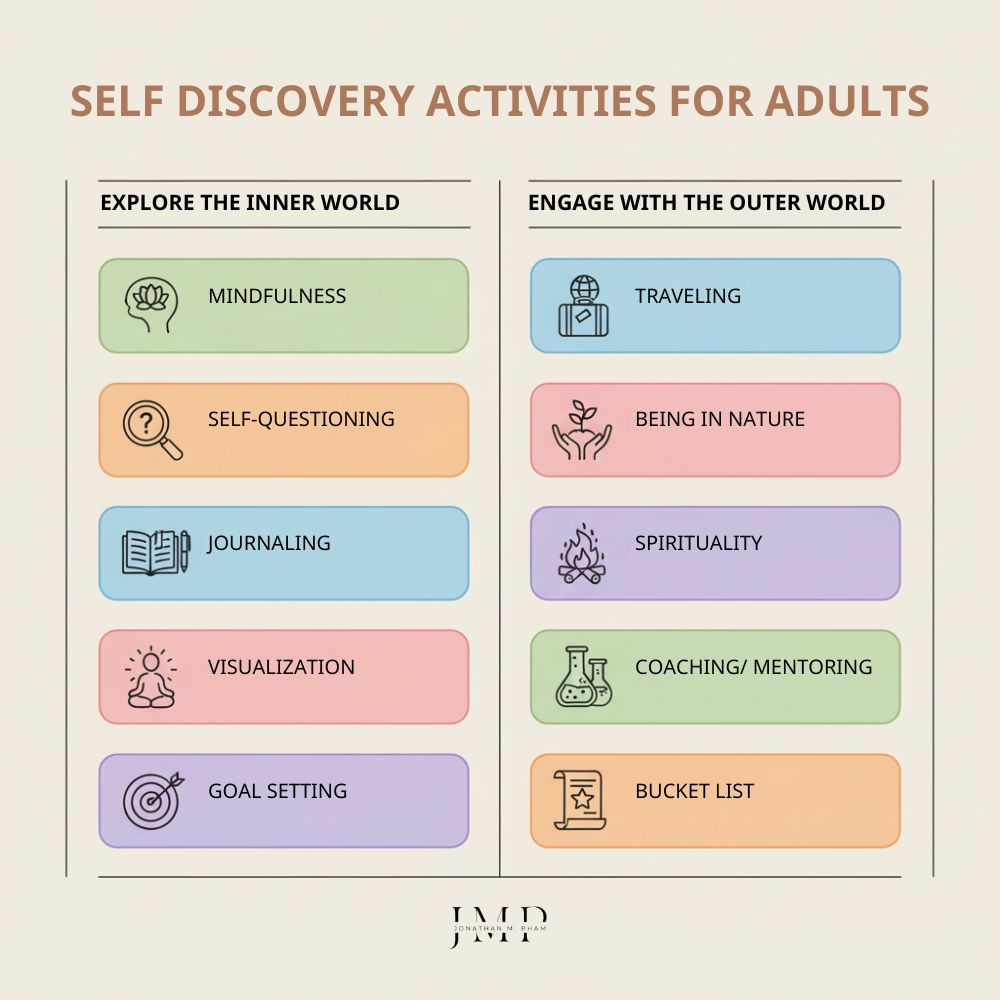
Self Discovery Activities for Youth & Students
The formative years of youth and adolescence are a time of immense growth and change. Self-knowledge during this period plays a crucial role in shaping future aspirations and choices.
- Taking personality assessments: Tests such as DISC, Myers-Briggs Type Indicator (MBTI), and Big Five Personality Traits offer a framework for discerning one’s strengths, weaknesses, and behavioral styles – based on which one may come up with strategies for self-development. That said, these assessments are not definitive. It’s important to use them as a starting point for self-discovery and to continue to learn and grow throughout life.
- SWOT analysis: What are you good at? What do you enjoy doing? What are your weaknesses or areas of vulnerability? What are the possibilities for personal and professional growth? What are the potential threats to your goals? Conducting a regular SWOT analysis makes it simpler to stay focused on one’s goals and come up with informed decisions that will lead to long-term success.
- Kokology games: Kokology games provide a unique and engaging method for young people to delve into their subconscious minds and gain insights into their motivations. These games often involve answering seemingly simple questions about hypothetical scenarios, and the answers can reveal hidden aspects of one’s personality.
- Participating in social activities: Social activities present opportunities to connect with others, explore new interests, acquire precious life skills, and broaden personal perspectives. Options to consider include joining clubs related to one’s hobbies, interests, or academic pursuits; volunteering for the community; attending social events; participating in sports or study groups, etc.
- Career exploration: Career exploration is a crucial step in the self-discovery process, especially for young people. It involves identifying one’s interests, values, and skills to make informed decisions about one’s future career path. Through activities such as strength/weakness assessment, interest inventories, career mapping, job shadowing, etc., one is better equipped to make informed decisions about their future and pursue a fulfilling professional path.
- Reading: Reading stimulates the brain and enhances cognitive abilities like memory, concentration, and critical thinking. In addition, it also enables a deeper understanding of human emotions and behaviors. For self-discovery purposes, one may consider exploring books on topics such as self-improvement (e.g. Atomic Habits by James Clear), psychology (e.g. Man’s Search for Meaning by Viktor Frankl), and spirituality (e.g. The Power of Now by Eckhart Tolle).
- Learning something new: A fantastic way to stimulate the mind, challenge yourself, and discover hidden talents. Whether you’re interested in learning a new language, coding, or playing a musical instrument, there are countless opportunities to learn and grow. Platforms like Coursera, edX, and Udemy offer a wide range of online courses on various subjects. Or, you can also enroll in local workshops or classes to learn new skills in person.
- Prioritizing self-care: Taking care of yourself is not selfish; it’s essential for improving your overall well-being and ensuring mind-body-spirit connection. Make regular physical exercises (e.g. running, swimming, cycling, Qigong, Tai Chi, yoga, etc.) a priority, and don’t forget to get adequate sleep and nutrition too.
- Art therapy: Creative outlets make it possible for one to express (and therefore understand) emotions that may be difficult to articulate verbally. Additionally, they also provide a relaxing and therapeutic way to reduce stress and anxiety, improve cognitive function, and boost self-esteem. There are countless outlets for one to explore – painting, drawing, writing, sculpting, music, singing, dancing, digital art, to name a few.
Read more: 11 Essential Singing Tips for Beginners
- Pursuing interests & passions: Engaging in activities you love helps boost your mood and overall happiness in life. Not to mention, it also allows you to acquire new skills and connect with like-minded individuals. Take some time to reflect on the activities that bring you joy, schedule regular time for them, and don’t be afraid to try new things!
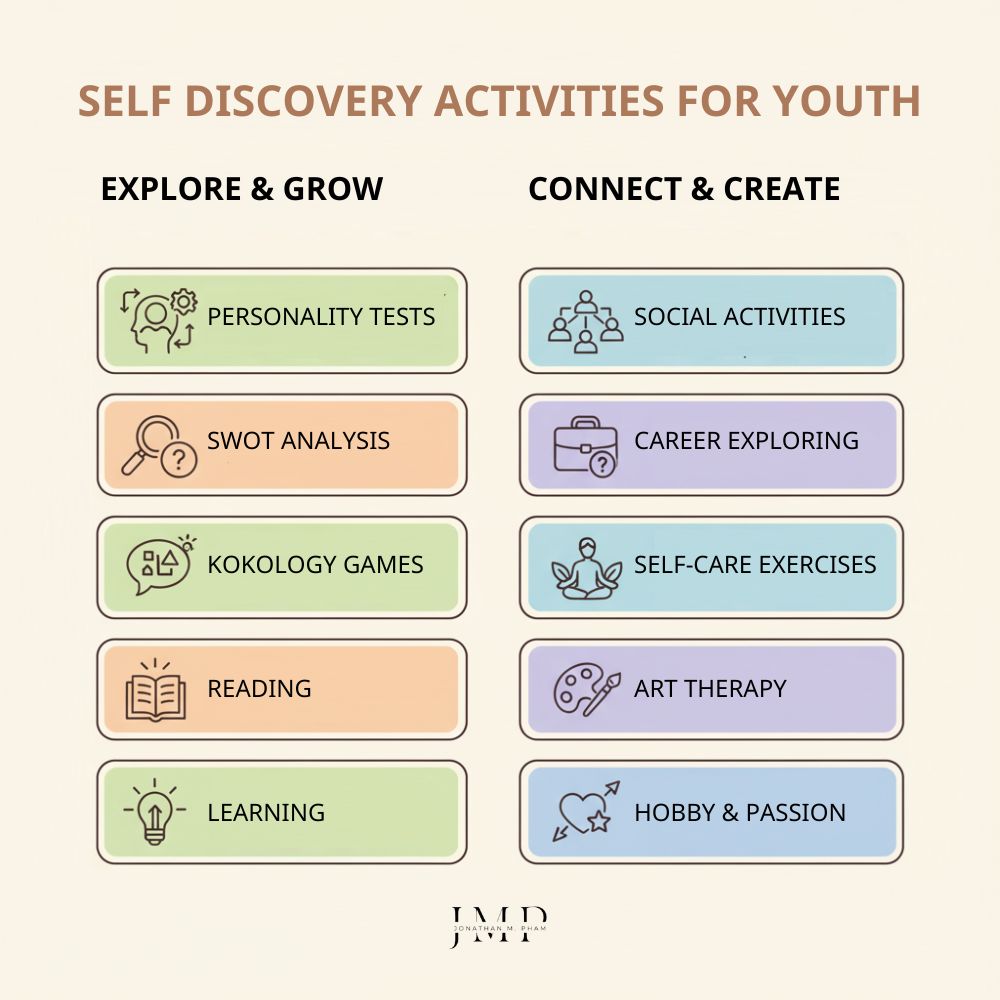
Self discovery activities for high school & college students
Self Discovery Activities for Kids
Nurturing a child’s curiosity and sense of self is essential for their overall development. These activities encourage kids to explore their creativity, imagination, and empathy, setting the foundation for a lifelong journey of self-discovery.
- Positive affirmations: Repeating positive statements has been proven to aid in reprograming one’s mind to focus on their strengths and abilities – thereby cultivating a positive self-image and boosting self-esteem. Repeat affirmations daily, such as in the morning or before bed (e.g. ‘I am smart and capable’, ‘I am kind and helpful’, ‘I am loved and accepted’, ‘I can do anything I set my mind to.’, etc.). Have your child look in the mirror and say positive affirmations aloud. Make colorful cards with positive affirmations and place them around the house.
- Gratitude jars: A fun, yet effective way to teach kids the importance of gratitude and positive thinking. By regularly writing down things they are grateful for, children will gradually develop a more positive outlook on life and enhance their overall well-being. Each day, encourage your child to write down one thing they are grateful for (which can be anything – from a favorite toy to a kind act from a friend). Periodically, take out the papers and read them together.
- Arts & crafts: Activities such as drawing, sculpting, modeling, collage, paper crafts (e.g. folding origami, making paper airplanes), and DIY Projects (e.g. building birdhouses) are wonderful for sparking creativity, self-expression, and love of learning in children.
- Storytelling: Aside from language and cognitive development, sharing stories also helps kids express their feelings, develop social skills (e.g. listening, empathy, and cooperation), and think out of the box.
- Board games & puzzles: Classic board games such as chess, checkers, and backgammon can teach strategic thinking and problem-solving, while cooperative games like Pandemic and Forbidden Island encourage teamwork and cooperation. At the same time, jigsaw puzzles can improve spatial reasoning, problem-solving, and fine motor skills.
- Cooking & baking: Cooking and baking are fun and educational activities that can teach children valuable life skills. On the other hand, they also provide an opportunity to create lasting memories.
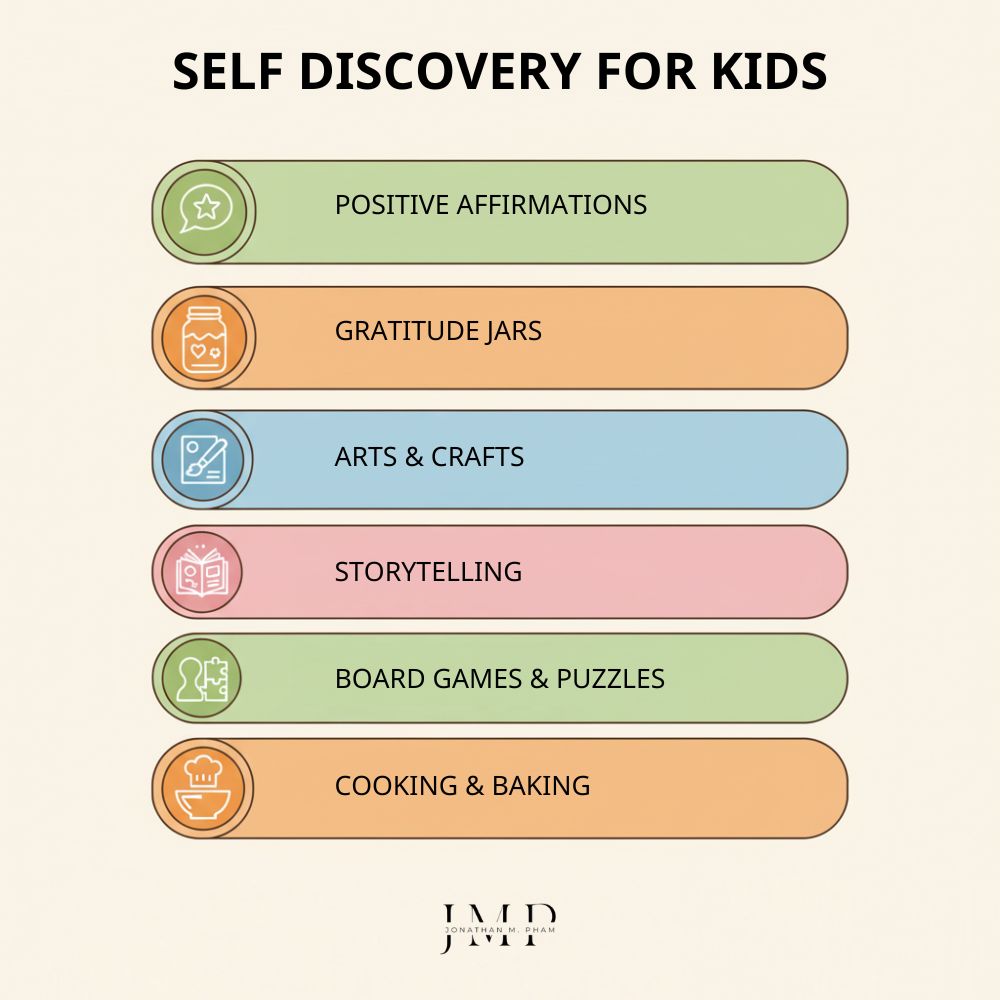
Self discovery practices for toddlers & preschoolers
Self Discovery Group Activities
Shared experiences and collective exploration can significantly amplify the effectiveness of self-discovery. These group activities offer opportunities for individuals to connect with others, gain new perspectives, and support one another on their personal journeys.
- Group discussions & debates: Engaging in group discussions offers a dynamic and engaging way to explore ideas, challenge assumptions, and develop critical thinking skills. By participating in them, individuals may acquire a deeper understanding of themselves and the world around them.
- Feedback exchange: A 360-degree feedback process that involves multiple sources, such as colleagues, supervisors, and subordinates, provides a powerful tool for self-discovery and personal growth.
- Accountability partnering: Accountability partnering involves working with another person to hold each other responsible for achieving specific goals. To find a trusted partner, you can look for friends or family members who share similar goals, join online forums or social media groups to connect with like-minded people, or hire a professional for personalized support.
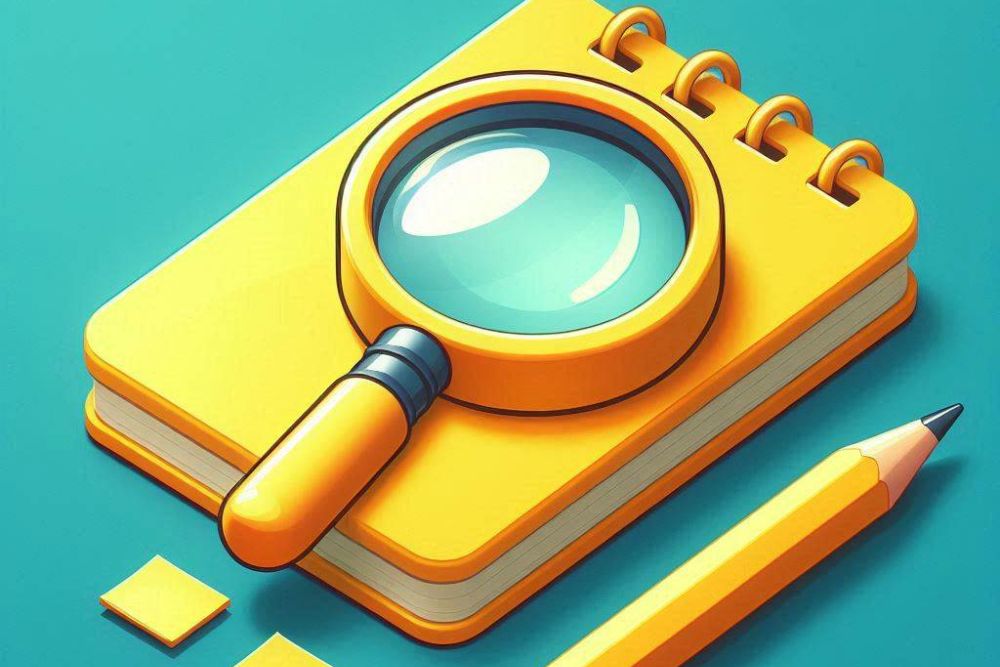
- Group projects/ simulations: Participating in group projects and simulations is a chance for individuals to develop essential leadership skills, such as communication, teamwork, problem-solving, and decision-making.
- Retreats: Retreats and camping trips offer unique opportunities for individuals to disconnect from their daily routines, connect with nature, and engage in self-reflection.
- Workshops & training sessions: A powerful tool for self-discovery within a group setting, workshops provide a structured environment where individuals can explore their thoughts, feelings, and behaviors in a supportive and collaborative atmosphere.
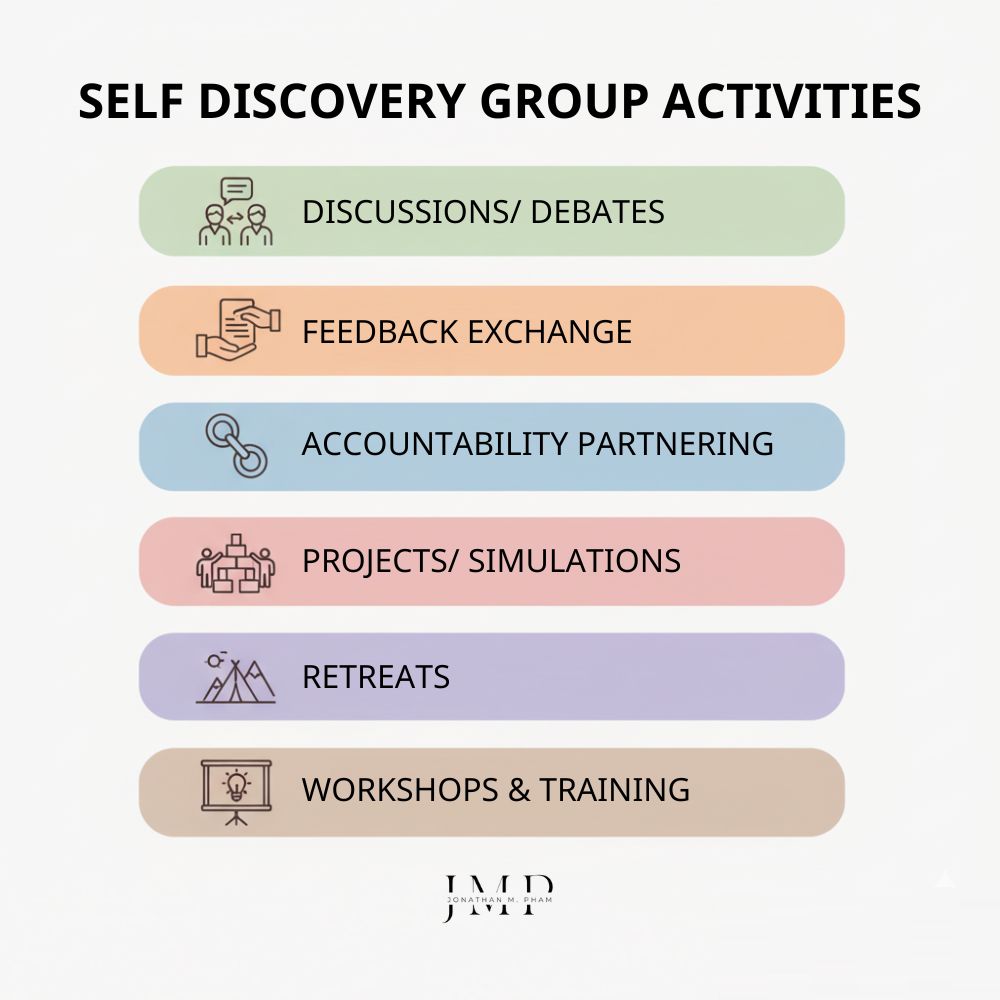
Self-awareness games for groups
FAQs
What is a self-discovery activity?
Self-discovery activities are exercises or experiences designed to help you better understand yourself. They can involve introspection, creative expression, or physical activities. The goal is to gain insights into your values, beliefs, strengths, weaknesses, and passions.
Why is self-discovery important?
- Enhanced self-awareness: By understanding yourself better, you can make more informed decisions and navigate challenges with greater clarity.
- Improved relationships: Knowing your needs and boundaries allows you to build healthier and more fulfilling relationships with others.
- Increased self-confidence: Discovering your strengths and potential typically results in a significant boost to self-esteem.
- Greater personal growth: Inspire you to pursue your passions and set meaningful goals.
- Reduced stress and anxiety: Being aware of your triggers and coping mechanisms can help you manage stress and anxiety more effectively.
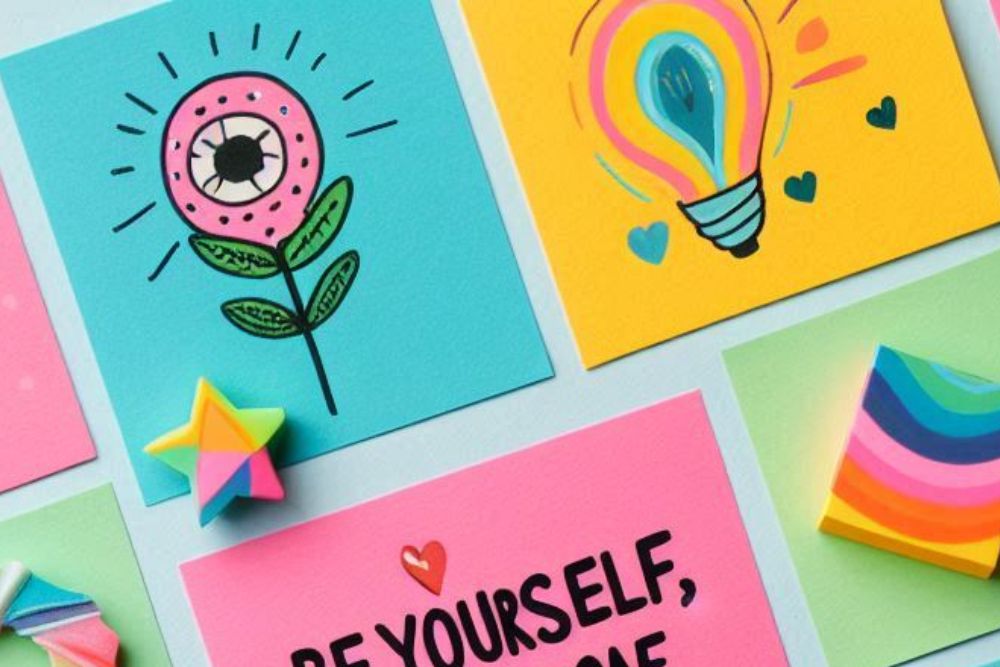
What can you do for self-discovery?
Self-discovery is a multifaceted journey with various elements and pillars that guide the process.
Elements:
- Self-awareness: Understanding your thoughts, feelings, strengths, weaknesses, values, and beliefs.
- Introspection: Reflecting on your past experiences, motivations, and desires.
- Exploration: Trying new things, stepping outside your comfort zone, and embracing new experiences.
- Mindfulness: Paying attention to the present moment without judgment.
Pillars:
- Personal values: Identifying what truly matters to you and aligning your actions with your values.
- Passions: Discovering your interests and pursuing activities that bring you fulfillment.
- Goals: Coming up with meaningful goals and creating a roadmap to achieve them.
- Relationships: Building and nurturing strong connections with others.
- Mindset: Cultivating a positive and growth-oriented mindset.
Resources for facilitating the journey:

What if I don’t know what I’m passionate about?
It’s perfectly normal not to know what you’re passionate about right away. In fact, many people struggle with this at some point in their lives. Here are some tips to help you discover your passions:
Explore different interests:
- Try new things: Sign up for a class, volunteer, or take on a new hobby.
- Revisit old hobbies: Rediscover activities you enjoyed as a child or teenager.
- Read widely: Explore different genres and subjects to find what sparks your interest.
- Travel: Immerse yourself in new cultures and experiences.
Reflect on your values:
- What matters most to you? Consider your beliefs, principles, and what you find important in life.
- How can you align your passions with your values? Look for activities that help you make a positive impact on the world.
Pay attention to your inner world:
- What makes you feel excited, energized, or fulfilled?
- What activities make you lose track of time?
Talk to others:
- Seek advice from friends, family, or mentors.
- Discuss your interests and goals with others.
Passions are subject to evolution over time. It’s okay to not have it all figured out right now. The most important thing is to keep exploring and learning, be patient with yourself, and don’t be afraid to change your mind!
Read more: Ikigai (生き甲斐) – The Blueprint for a Purposeful & Fulfilling Life

Self discovery exercises
Final Thoughts
Finding oneself is a personal journey that requires courage, curiosity, and an open heart. By incorporating the above-mentioned self discovery activities into your life, you will be ready to unlock hidden potential, cultivate meaningful connections, and live a more fulfilling existence!
Bon voyage!
Other resources you might be interested in:
- Self-leadership: The Art of Leading from Within
- Healing Your Inner Child: A 15-step Guide
- Habits in Personality Development: A Comprehensive Guide
Let’s Tread the Path Together, Shall We?


